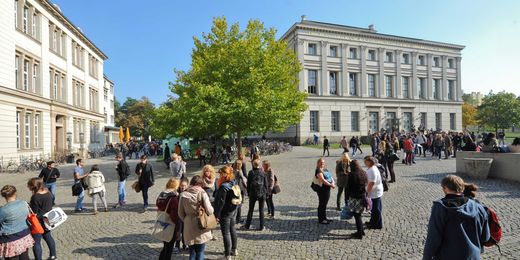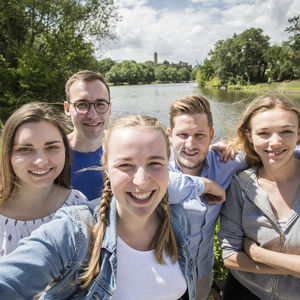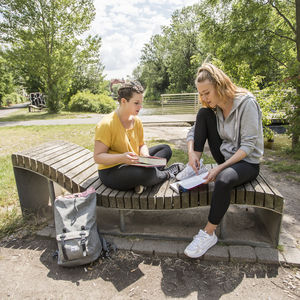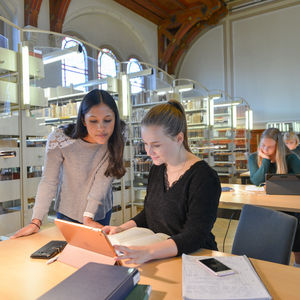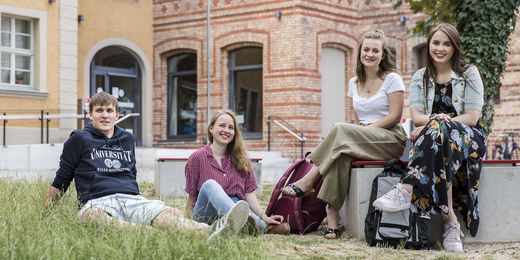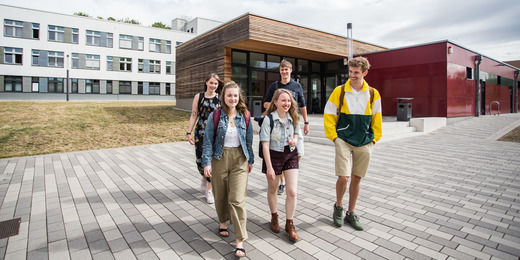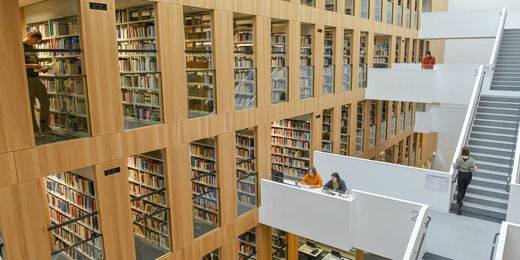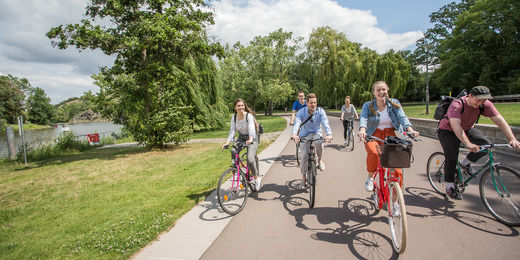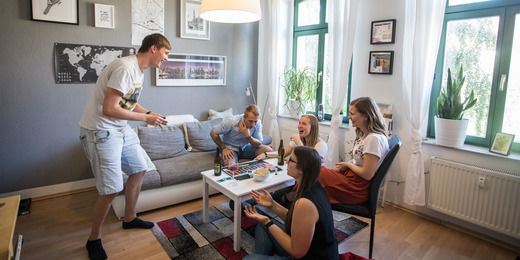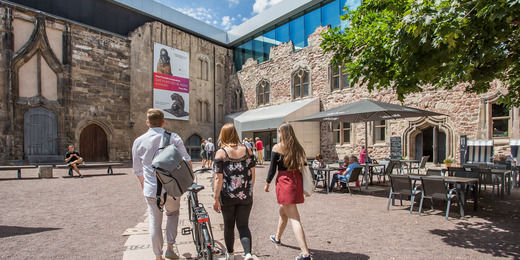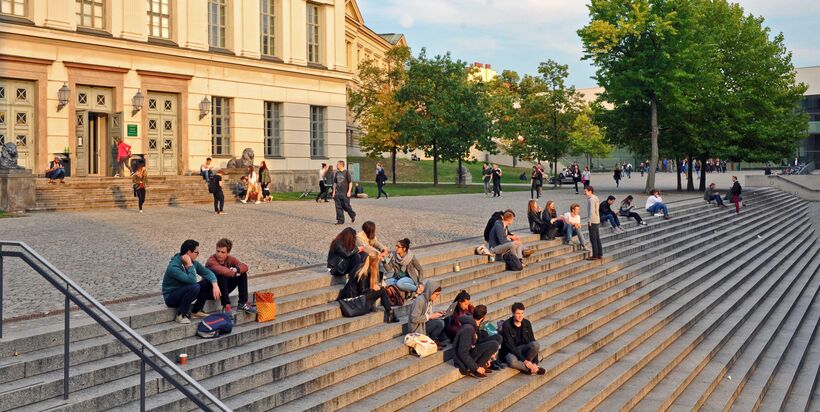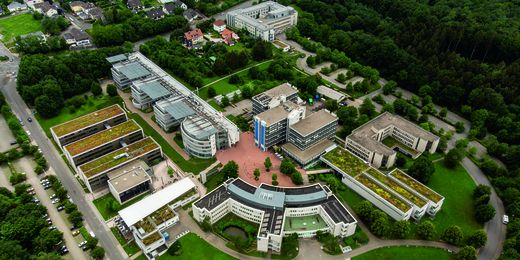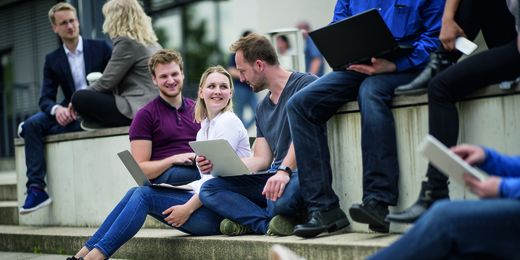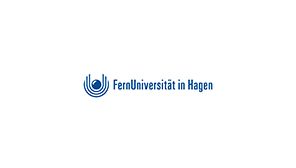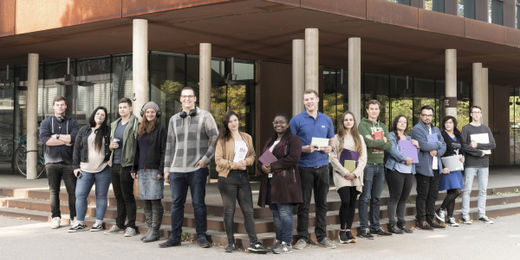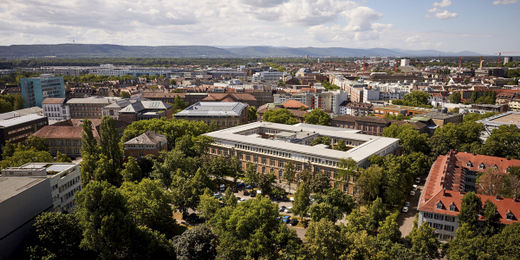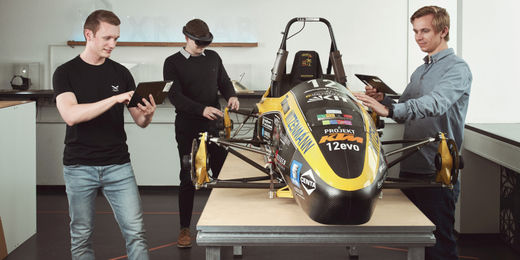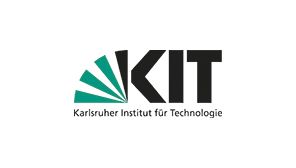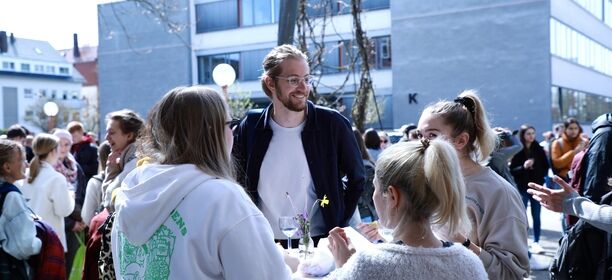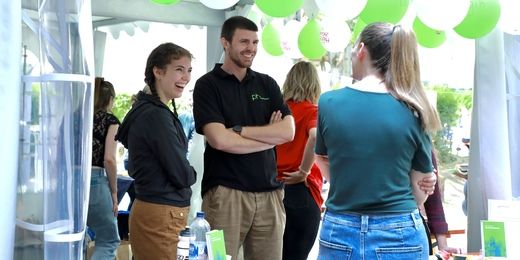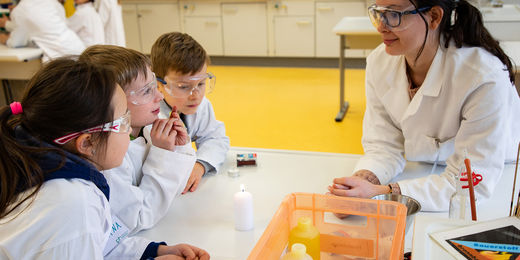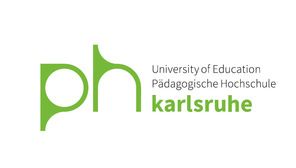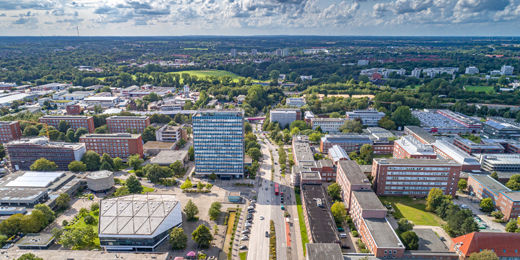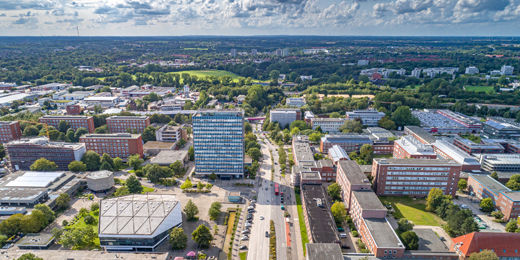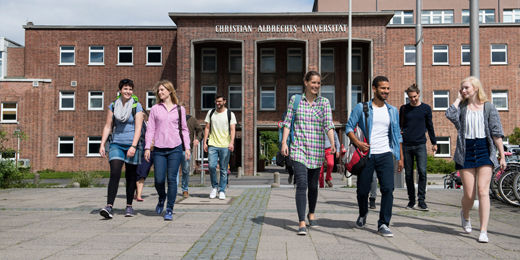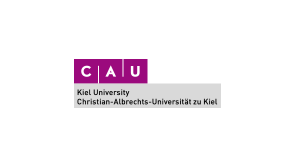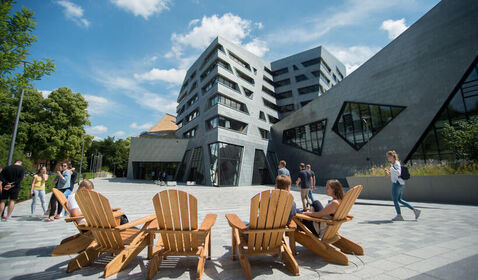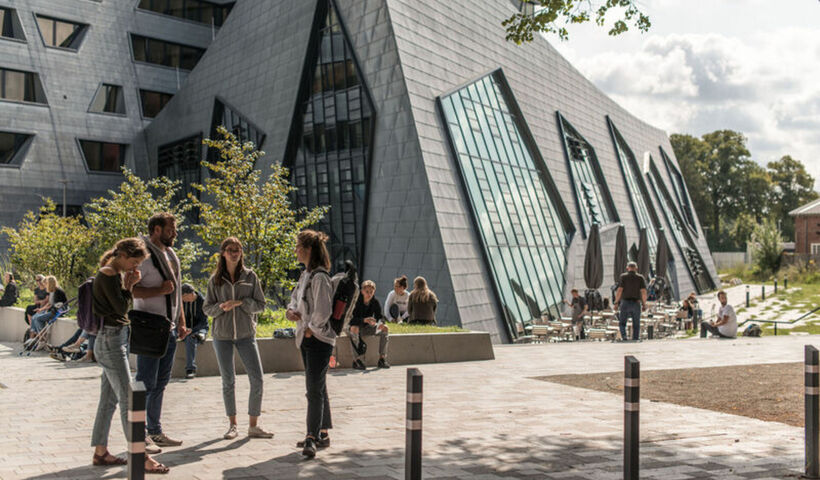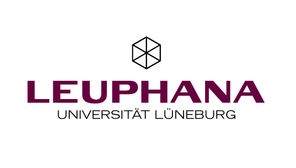Martin-Luther-Universität Halle-Wittenberg
- Promotionsrecht: Ja
- Trägerschaft: öffentlich-rechtlich
- 1502 gegründet
- 19.227 Studierende
Studieren zwischen Tradition und Subkultur. Eine aufregende Geschichte, altehrwürdige Gebäude, ein neuer Campus und Kooperationen mit führenden Unternehmen – Studieren an der Martin-Luther-Universität Halle-Wittenberg (MLU) bedeutet vor allem eins: Abwechslung!
Hochschule im Fokus
Genieße deine Studienzeit!
Stell dir vor, du wachst auf, weil die Sonne dich an der Nasenspitze kitzelt. Draußen auf dem Balkon vor deinem Fenster siehst du deine Mitbewohner*innen, die gerade zum Frühstück zusammensitzen. Der Duft von frischen Brötchen und Kaffee zieht durch das offene Fenster bis zu deiner Nase. Du stehst auf, gehst durch den Flur des Altbaus ins Badezimmer. Nach dem Frühstück schwingst du dich auf dein Fahrrad und radelst durch die Stadt zum Campus. Auf der Wiese und auf den Treppen am Universitätsplatz sitzen jetzt schon Studierende und genießen die warmen Sonnenstrahlen. Du besuchst erstmal die Vorlesung. Geschafft! Jetzt aber Mittagspause – Denken macht schließlich hungrig. Also ab in die Mensa, bevor sich die lange Schlange bildet, denn heute gibt es Süßkartoffelpommes. Am Nachmittag gehst du noch in ein Seminar und in die Bibliothek auf dem Steintor-Campus. Und weil Studieren nicht alles ist: Weiter zum Unisport – Rudern steht heute auf dem Programm. Danach bringt dich die Straßenbahn quer durch die Stadt zu einer Party mit Freunden, mitten im Grünen. Als du irgendwann spät nachts ins Bett fällst, denkst du: Wenn ich im Winter mein Auslandssemester mache, werde ich das alles sicher ein bisschen vermissen.
Das klingt wie ein Traum? Nein! Das ist die Uni Halle:
- ein breites Studienangebote: individuell kombinierbare Studiengänge, über 50 Prozent davon ohne NC zur freien Einschreibung
- der geschichtsträchtige Universitätscampus
- der Technologiepark Weinbergcampus
- der neue Steintor-Campus
- der Medizin-Campus Heide-Süd
- Partneruniversitäten und Austauschprogramme
- das Unisportzentrum: von A wie Akrobatik bis Z wie Zumba
Und außerdem findest du in der Stadt Halle (Saale):
- verfügbaren, günstigen und attraktiven Wohnraum
- ein abwechslungsreiches Freizeitangebot
- vielfältige Möglichkeiten, dich zu entfalten
Unsere Studienbotschafter*innen
Universitätsplatz 11
06108 Halle
Tel: 0345 55-21308
Fax: 0345 55-27052
Hochschule im CHE-Ranking abschneiden.
Die Martin-Luther-Universität Halle-Wittenberg gehört zu den Universitäten.
Ja, du kannst an der Martin-Luther-Universität Halle-Wittenberg promovieren.
Die Martin-Luther-Universität Halle-Wittenberg ist eine öffentlich-rechtliche Hochschule. Es gibt staatliche und staatlich anerkannte Hochschulen, die meist in Universitäten, Fachhochschulen (international: University of Applied Sciences) und Kunst- sowie Musikhochschulen unterteilt werden. Der überwiegende Teil der Hochschulen wird vom Staat finanziert und befindet sich daher in staatlicher Trägerschaft. Dort fallen in der Regel nur geringe Semesterbeiträge an. An den privaten Hochschulen hingegen, die sich über private Trägerschaften finanzieren, können wesentlich höhere Studiengebühren anfallen. Einen Weg, die finanziellen Hürden dieser Hochschulen zu umgehen, können Stipendien darstellen.
Es gibt außerdem Hochschulen, die von der protestantischen oder katholischen Kirche betrieben werden.
Die Martin-Luther-Universität Halle-Wittenberg wurde im Jahr 1502 gegründet.
Insgesamt gibt es 19227 Studierende an der Martin-Luther-Universität Halle-Wittenberg.
Standort dieser Hochschule ist Halle.
Hier findest du die Fristen und Termine für deine Bewerbung:
- Vorlesungszeit:
-
07.10.2024 - 01.02.2025Unterbrechungen: An allen gesetzlichen Feiertagen und vom 21.12.2024 bis 03.01.2025
- Studienanfänger:
-
03.05.2024 - 30.09.2024Deutsche mit ausländischem Abschluss bewerben sich bitte über uni-assist. Fristen siehe "International Studierende". Eine Immatrikulation in ein höheres Fachsemester kann nur mit einem Einstufungsbescheid vom zuständigen Studien- und Prüfungsausschuss erfolgen.
- Hochschulwechsler:
-
03.05.2024 - 30.09.2024Eine Immatrikulation in ein höheres Fachsemester kann nur mit einem Einstufungsbescheid vom zuständigen Studien- und Prüfungsausschuss erfolgen. Deutsche mit ausländischem Abschluss bewerben sich bitte über uni-assist. Fristen siehe "International Studierende".
- International Studierende aus der Europäischen Union:
-
01.03.2024 - 15.07.2024Die Bewerbung erfolgt über www.uni-assist.de. Hinweis: Eine Bewerbung für ein höheres Fachsemester kann nur mit einem Einstufungsbescheid vom zuständigen Studien- und Prüfungsausschuss erfolgen.
- International Studierende aus Staaten, die nicht Mitglied der EU sind:
-
01.03.2024 - 15.07.2024Die Bewerbung erfolgt über www.uni-assist.de. Hinweis: Eine Bewerbung für ein höheres Fachsemester kann nur mit einem Einstufungsbescheid vom zuständigen Studien- und Prüfungsausschuss erfolgen.
- Studienanfänger:
-
03.05.2024 - 15.07.2024Deutsche mit ausländischem Abschluss bewerben sich bitte über uni-assist. Fristen siehe "International Studierende". Eine Bewerbung für ein höheres Fachsemester kann nur mit einem Einstufungsbescheid vom zuständigen Studien- und Prüfungsausschuss erfolgen.
- Hochschulwechsler:
-
03.05.2024 - 15.07.2024Eine Bewerbung für ein höheres Fachsemester kann nur mit einem Einstufungsbescheid vom zuständigen Studien- und Prüfungsausschuss erfolgen. Deutsche mit ausländischem Abschluss bewerben sich bitte über uni-assist. Fristen siehe "International Studierende".
- International Studierende aus der Europäischen Union:
-
01.03.2024 - 15.07.2024Die Bewerbung erfolgt über www.uni-assist.de. Hinweis: Eine Bewerbung für ein höheres Fachsemester kann nur mit einem Einstufungsbescheid vom zuständigen Studien- und Prüfungsausschuss erfolgen.
- International Studierende aus Staaten, die nicht Mitglied der EU sind:
-
01.03.2024 - 15.07.2024Die Bewerbung erfolgt über www.uni-assist.de. Hinweis: Eine Bewerbung für ein höheres Fachsemester kann nur mit einem Einstufungsbescheid vom zuständigen Studien- und Prüfungsausschuss erfolgen.
- Studienanfänger:
-
03.05.2024 - 31.08.2024Deutsche mit ausländischem Abschluss bewerben sich bitte über uni-assist. Fristen siehe "International Studierende". Eine Bewerbung für ein höheres Fachsemester kann nur mit einem Einstufungsbescheid vom zuständigen Studien- und Prüfungsausschuss erfolgen.
- Hochschulwechsler:
-
03.05.2024 - 31.08.2024Eine Bewerbung für ein höheres Fachsemester kann nur mit einem Einstufungsbescheid vom zuständigen Studien- und Prüfungsausschuss erfolgen. Deutsche mit ausländischem Abschluss bewerben sich bitte über uni-assist. Fristen siehe "International Studierende".
- International Studierende aus der Europäischen Union:
-
01.03.2024 - 15.06.2024Die Bewerbung erfolgt über www.uni-assist.de. Hinweis: Eine Bewerbung für ein höheres Fachsemester kann nur mit einem Einstufungsbescheid vom zuständigen Studien- und Prüfungsausschuss erfolgen.
- International Studierende aus Staaten, die nicht Mitglied der EU sind:
-
01.03.2024 - 15.06.2024Die Bewerbung erfolgt über www.uni-assist.de. Hinweis: Eine Bewerbung für ein höheres Fachsemester kann nur mit einem Einstufungsbescheid vom zuständigen Studien- und Prüfungsausschuss erfolgen.
- Studienanfänger:
-
03.05.2024 - 15.07.2024Deutsche mit ausländischem Abschluss bewerben sich bitte über uni-assist. Fristen siehe "International Studierende". Eine Bewerbung für ein höheres Fachsemester kann nur mit einem Einstufungsbescheid vom zuständigen Studien- und Prüfungsausschuss erfolgen.
- Hochschulwechsler:
-
03.05.2024 - 15.07.2024Eine Bewerbung für ein höheres Fachsemester kann nur mit einem Einstufungsbescheid vom zuständigen Studien- und Prüfungsausschuss erfolgen. Deutsche mit ausländischem Abschluss bewerben sich bitte über uni-assist. Fristen siehe "International Studierende".
- International Studierende aus der Europäischen Union:
-
01.03.2024 - 15.06.2024Die Bewerbung erfolgt über www.uni-assist.de. Hinweis: Eine Bewerbung für ein höheres Fachsemester kann nur mit einem Einstufungsbescheid vom zuständigen Studien- und Prüfungsausschuss erfolgen.
- International Studierende aus Staaten, die nicht Mitglied der EU sind:
-
01.03.2024 - 15.06.2024Die Bewerbung erfolgt über www.uni-assist.de. Hinweis: Eine Bewerbung für ein höheres Fachsemester kann nur mit einem Einstufungsbescheid vom zuständigen Studien- und Prüfungsausschuss erfolgen.
- Vorlesungszeit:
-
02.04.2024 - 06.07.2024
- Hochschulwechsler:
-
Die Frist ist abgelaufen
- International Studierende aus der Europäischen Union:
-
Die Frist ist abgelaufen
- International Studierende aus Staaten, die nicht Mitglied der EU sind:
-
Die Frist ist abgelaufen
- Hochschulwechsler:
-
Die Frist ist abgelaufen
- International Studierende aus der Europäischen Union:
-
Die Frist ist abgelaufen
- International Studierende aus Staaten, die nicht Mitglied der EU sind:
-
Die Frist ist abgelaufen
- Studienanfänger:
-
Die Frist ist abgelaufen
- Hochschulwechsler:
-
Die Frist ist abgelaufen
- International Studierende aus der Europäischen Union:
-
Die Frist ist abgelaufen
- International Studierende aus Staaten, die nicht Mitglied der EU sind:
-
Die Frist ist abgelaufen
- Studienanfänger:
-
Die Frist ist abgelaufen
- Hochschulwechsler:
-
Die Frist ist abgelaufen
- International Studierende aus der Europäischen Union:
-
Die Frist ist abgelaufen
- International Studierende aus Staaten, die nicht Mitglied der EU sind:
-
Die Frist ist abgelaufen
Als Fakultät wird eine Gruppe von Fächern oder eine Abteilung mit mehreren Wissenschaftsbereichen bezeichnet. Sie bildet eine
Lehr- und Verwaltungseinheit und ist für die Organisation von Forschung, Lehre und dem Studium an sich des jeweiligen Fachbereichs
verantwortlich.
An der Martin-Luther-Universität Halle-Wittenberg gibt es folgende Fakultäten und Fachbereiche:
- Theologische Fakultät
- Jurisitische und Wirtschaftswissenschaftliche Fakultät
- Medizinische Fakultät
- Philosophische Fakultät I (Sozialwissenschaften und historische Kulturwissenschaften)
- Philosophische Fakultät II (Philologien, Kommunikations- und Musikwissenschaften)
- Philosophische Fakultät III (Erziehungswissenschaften)
- Naturwissenschaftliche Fakultät I (Biowissenschaften)
- Naturwissenschaftliche Fakultät II (Chemie, Physik und Mathematik)
- Naturwissenschaftliche Fakultät III (Agrar- und Ernährungswissenschaften, Geowissenschaften und Informatik)
- Vorlesungszeit:
-
07.10.2024 - 01.02.2025Unterbrechungen: An allen gesetzlichen Feiertagen und vom 21.12.2024 bis 03.01.2025
- Studienanfänger:
-
03.05.2024 - 30.09.2024Deutsche mit ausländischem Abschluss bewerben sich bitte über uni-assist. Fristen siehe "International Studierende". Eine Immatrikulation in ein höheres Fachsemester kann nur mit einem Einstufungsbescheid vom zuständigen Studien- und Prüfungsausschuss erfolgen.
- Hochschulwechsler:
-
03.05.2024 - 30.09.2024Eine Immatrikulation in ein höheres Fachsemester kann nur mit einem Einstufungsbescheid vom zuständigen Studien- und Prüfungsausschuss erfolgen. Deutsche mit ausländischem Abschluss bewerben sich bitte über uni-assist. Fristen siehe "International Studierende".
- International Studierende aus der Europäischen Union:
-
01.03.2024 - 15.07.2024Die Bewerbung erfolgt über www.uni-assist.de. Hinweis: Eine Bewerbung für ein höheres Fachsemester kann nur mit einem Einstufungsbescheid vom zuständigen Studien- und Prüfungsausschuss erfolgen.
- International Studierende aus Staaten, die nicht Mitglied der EU sind:
-
01.03.2024 - 15.07.2024Die Bewerbung erfolgt über www.uni-assist.de. Hinweis: Eine Bewerbung für ein höheres Fachsemester kann nur mit einem Einstufungsbescheid vom zuständigen Studien- und Prüfungsausschuss erfolgen.
- Studienanfänger:
-
03.05.2024 - 15.07.2024Deutsche mit ausländischem Abschluss bewerben sich bitte über uni-assist. Fristen siehe "International Studierende". Eine Bewerbung für ein höheres Fachsemester kann nur mit einem Einstufungsbescheid vom zuständigen Studien- und Prüfungsausschuss erfolgen.
- Hochschulwechsler:
-
03.05.2024 - 15.07.2024Eine Bewerbung für ein höheres Fachsemester kann nur mit einem Einstufungsbescheid vom zuständigen Studien- und Prüfungsausschuss erfolgen. Deutsche mit ausländischem Abschluss bewerben sich bitte über uni-assist. Fristen siehe "International Studierende".
- International Studierende aus der Europäischen Union:
-
01.03.2024 - 15.07.2024Die Bewerbung erfolgt über www.uni-assist.de. Hinweis: Eine Bewerbung für ein höheres Fachsemester kann nur mit einem Einstufungsbescheid vom zuständigen Studien- und Prüfungsausschuss erfolgen.
- International Studierende aus Staaten, die nicht Mitglied der EU sind:
-
01.03.2024 - 15.07.2024Die Bewerbung erfolgt über www.uni-assist.de. Hinweis: Eine Bewerbung für ein höheres Fachsemester kann nur mit einem Einstufungsbescheid vom zuständigen Studien- und Prüfungsausschuss erfolgen.
- Studienanfänger:
-
03.05.2024 - 31.08.2024Deutsche mit ausländischem Abschluss bewerben sich bitte über uni-assist. Fristen siehe "International Studierende". Eine Bewerbung für ein höheres Fachsemester kann nur mit einem Einstufungsbescheid vom zuständigen Studien- und Prüfungsausschuss erfolgen.
- Hochschulwechsler:
-
03.05.2024 - 31.08.2024Eine Bewerbung für ein höheres Fachsemester kann nur mit einem Einstufungsbescheid vom zuständigen Studien- und Prüfungsausschuss erfolgen. Deutsche mit ausländischem Abschluss bewerben sich bitte über uni-assist. Fristen siehe "International Studierende".
- International Studierende aus der Europäischen Union:
-
01.03.2024 - 15.06.2024Die Bewerbung erfolgt über www.uni-assist.de. Hinweis: Eine Bewerbung für ein höheres Fachsemester kann nur mit einem Einstufungsbescheid vom zuständigen Studien- und Prüfungsausschuss erfolgen.
- International Studierende aus Staaten, die nicht Mitglied der EU sind:
-
01.03.2024 - 15.06.2024Die Bewerbung erfolgt über www.uni-assist.de. Hinweis: Eine Bewerbung für ein höheres Fachsemester kann nur mit einem Einstufungsbescheid vom zuständigen Studien- und Prüfungsausschuss erfolgen.
- Studienanfänger:
-
03.05.2024 - 15.07.2024Deutsche mit ausländischem Abschluss bewerben sich bitte über uni-assist. Fristen siehe "International Studierende". Eine Bewerbung für ein höheres Fachsemester kann nur mit einem Einstufungsbescheid vom zuständigen Studien- und Prüfungsausschuss erfolgen.
- Hochschulwechsler:
-
03.05.2024 - 15.07.2024Eine Bewerbung für ein höheres Fachsemester kann nur mit einem Einstufungsbescheid vom zuständigen Studien- und Prüfungsausschuss erfolgen. Deutsche mit ausländischem Abschluss bewerben sich bitte über uni-assist. Fristen siehe "International Studierende".
- International Studierende aus der Europäischen Union:
-
01.03.2024 - 15.06.2024Die Bewerbung erfolgt über www.uni-assist.de. Hinweis: Eine Bewerbung für ein höheres Fachsemester kann nur mit einem Einstufungsbescheid vom zuständigen Studien- und Prüfungsausschuss erfolgen.
- International Studierende aus Staaten, die nicht Mitglied der EU sind:
-
01.03.2024 - 15.06.2024Die Bewerbung erfolgt über www.uni-assist.de. Hinweis: Eine Bewerbung für ein höheres Fachsemester kann nur mit einem Einstufungsbescheid vom zuständigen Studien- und Prüfungsausschuss erfolgen.
- Vorlesungszeit:
-
02.04.2024 - 06.07.2024
- Hochschulwechsler:
-
Die Frist ist abgelaufen
- International Studierende aus der Europäischen Union:
-
Die Frist ist abgelaufen
- International Studierende aus Staaten, die nicht Mitglied der EU sind:
-
Die Frist ist abgelaufen
- Hochschulwechsler:
-
Die Frist ist abgelaufen
- International Studierende aus der Europäischen Union:
-
Die Frist ist abgelaufen
- International Studierende aus Staaten, die nicht Mitglied der EU sind:
-
Die Frist ist abgelaufen
- Studienanfänger:
-
Die Frist ist abgelaufen
- Hochschulwechsler:
-
Die Frist ist abgelaufen
- International Studierende aus der Europäischen Union:
-
Die Frist ist abgelaufen
- International Studierende aus Staaten, die nicht Mitglied der EU sind:
-
Die Frist ist abgelaufen
- Studienanfänger:
-
Die Frist ist abgelaufen
- Hochschulwechsler:
-
Die Frist ist abgelaufen
- International Studierende aus der Europäischen Union:
-
Die Frist ist abgelaufen
- International Studierende aus Staaten, die nicht Mitglied der EU sind:
-
Die Frist ist abgelaufen
- Theologische Fakultät
- Jurisitische und Wirtschaftswissenschaftliche Fakultät
- Medizinische Fakultät
- Philosophische Fakultät I (Sozialwissenschaften und historische Kulturwissenschaften)
- Philosophische Fakultät II (Philologien, Kommunikations- und Musikwissenschaften)
- Philosophische Fakultät III (Erziehungswissenschaften)
- Naturwissenschaftliche Fakultät I (Biowissenschaften)
- Naturwissenschaftliche Fakultät II (Chemie, Physik und Mathematik)
- Naturwissenschaftliche Fakultät III (Agrar- und Ernährungswissenschaften, Geowissenschaften und Informatik)
Studier‘ ungewöhnlich!
Du willst Archäologie studieren? Oder doch lieber BWL? Warum sollst du dich entscheiden? Mach‘ einfach beides! Die Uni Halle bietet dir ein breites Studienangebote. Viele Studiengänge kannst du ganz einfach kombinieren und dir so dein persönliches Traumstudium bauen.
Was dir das bringt? Nun ja, du machst genau das, was dich interessiert. du bist voll motiviert im Studium, weil du ein klares Ziel vor Augen hast. Zweifler kannst du schnell überzeugen: Auf dem Arbeitsmarkt glänzt du mit Fähigkeiten, die in deiner individuellen Kombination sonst wohl kaum jemand hat.
Aber auch, wenn du dich für einen klassischen Studiengang wie Medizin, Chemie oder Erziehungswissenschaften entscheidest, bist du an der Uni Halle richtig. Die Uni hat einen hohen Standard. Viele Studiengänge sind im CHE-Ranking bereits ausgezeichnet bewertet worden.
Mach dir keine Sorgen, wenn deine Abiturnote etwas durchwachsen ist. Hier an der Uni Halle sind über 50 Prozent des Studienangebots ohne NC zur freien Einschreibung. Checke gleich deine Zulassungschancen mit unserer NC-Ampel-App.
Wusstest Du schon, dass Unis vor allem Grundlagenforschung machen? Besonders gut ist die Uni Halle zum Beispiel in:
- Materialwissenschaften – Nanostrukturierte Materialien
Hier erforschen Wissenschaftler*innen neue Strukturen im Nanometerbereich. Ein Beispiel: Die Grenzfläche zwischen Oxiden und Metallen oder verschiedenen Oxiden bestimmt dann die Eigenschaften dieser Nanostruktur – die völlig neuartig sein können. Das Ziel: Neue Konzepte für die Informations- und Speichertechnologie entwickeln.
- Gesellschaft und Kultur in Bewegung. Diffusion – Experiment – Institution
Einer der geisteswissenschaftlichen Schwerpunkte beschäftigt sich damit, wie sich Kulturen und Gesellschaften verändern. Eine zentrale Frage ist, wie durch die gesteigerte Mobilität des Menschen auch der Austausch von Ideen beschleunigt wird und welche Folgen das für einzelne Regionen hat.
Mach‘, was dich weiterbringt!
Studieren bedeutet viel mehr als nur Bücher wälzen und Vorlesungen schwänzen... äh, besuchen. Es geht darum, dich persönlich weiterzuentwickeln, Dinge auszuprobieren, Leute kennenzulernen und die Nächte durchzufeiern.
Du warst zu Hause in einem Verein? Dann spiel Tischtennis, Fußball oder Tennis in der Unimannschaft. Du brauchst Entspannung? Lerne Yoga und autogenes Training. Du magst es lieber ungewöhnlich? Lerne Tauchen, Pole Dance oder Rudern. Oder du willst dich einfach nur Auspowern? Im Fitnessstudio kannst du einfach mal abschalten. Mit über zahlreichen Angeboten bietet das Unisportzentrum für jeden etwas. Profis und Halbprofis zeigen dir, wie’s richtig geht. Du denkst, als „armer Studierende*r“ kannst du dir das alles nicht leisten? Dann hast du noch nicht unsere studentenfreundlichen Preise gesehen. Schau einfach mal vorbei.
Und was wäre das Studium ohne Vereine und Hochschulgruppen? Sing im Chor, rocke mit der Uni Big-Band die Bühne, argumentiere deinen Gegner im Debattierclub in Grund und Boden, finde Gleichgesinnte in den Fachschaftsräten der Studiengänge, sei kreativ und mache Radio oder schreibe für eine der studentischen Zeitschriften.
Halle ist DIE ideale Stadt zum Experimentieren und Spaß haben: groß genug, um ein ausgebautes Netz von öffentlichen Verkehrsmitteln zu haben, klein genug, um auch mit dem Fahrrad überall hinkommen zu können.
Auch kulturell hat Halle einiges zu bieten: Hier gibt es Hochkultur mit zahlreichen etablierten Theatern sowie einer Oper – Deine Familie wird begeistert sein. Und es gibt Subkultur: eine große bunte Szene, eine Freiraumgalerie, die Graffitis an Hauswänden zeigt und günstige Ladenlokale – Deine Freunde werden Dich beneiden!
Alle Infos rund ums Studium


